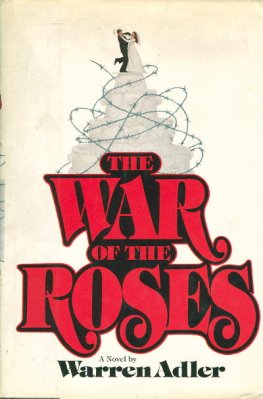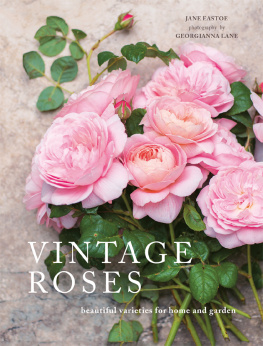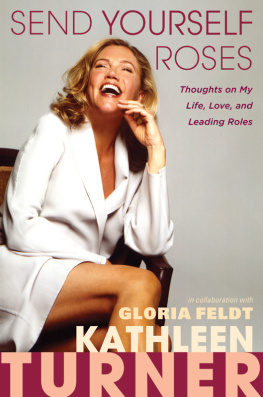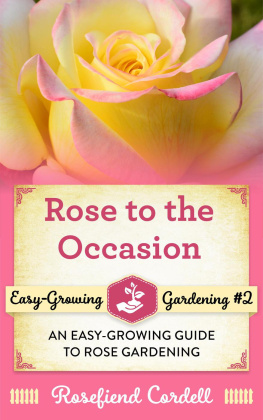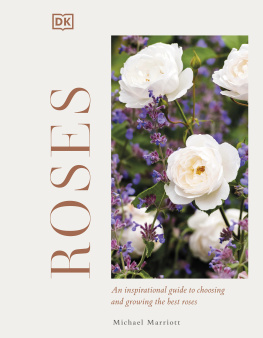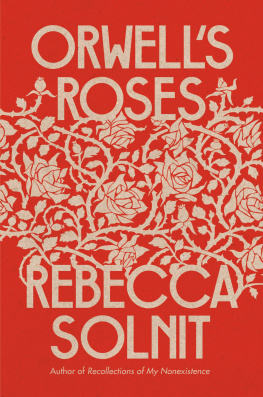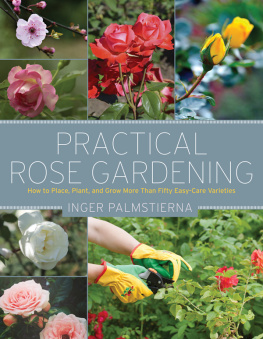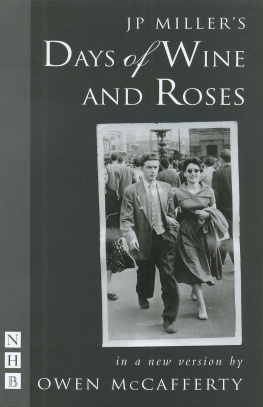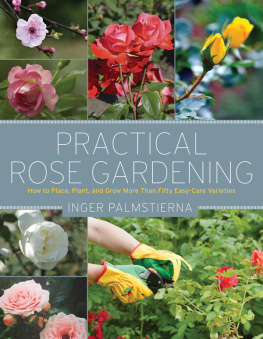Warren Adler
THE WAR OF THE ROSES
A cold rain whipped across the clapboard facade of the old house, spattering against the panes. Like everyone else in the bone-damp parlor set up theater style with folding wooden-slat seats, the auctioneer raised his gloomy eyes toward the windows, perhaps hoping the gusty rain would shoot out the glass and abort the abysmal performance.
Oliver Rose sat on an aisle seat, a few rows back from the podium, his long legs stretched out on the battered wooden floor. The room was less than half full, no more than thirty people. Behind the auctioneer, strewn around like the aftermath of a bombing, lay the assorted possessions of the family Barker, the last of whom had lived long enough to make some of this junk valuable.
its a genuine Boston rocker, the auctioneer droned, his voice cracked and pleading as he pointed to a much abused Windsor-style rocking chair. Made by Hitchcock, Alford and Company, one of the finest names in chairs. He looked lugubriously around the silent room, no longer expectant. Damn, he snapped. Its a genuine antique.
Ten bucks, a ladys voice crackled. She was sitting in the first row, bundled in a dirty Irish sweater.
Ten bucks? the auctioneer protested. Look at these tapered back spindles, the scrolled top rail, the shaped seat.
All right, twelve-fifty, the lady huffed. She had been buying most of the furniture offered, and it seemed to Oliver that the auction was being held for her benefit.
The whole thing stinks, a voice hissed. It came from a veined Yankee face beside him. The rains mucked it all up. Shes got the antique store in Provincetown. Shell get it all for a song and sell it off to the tourists for ten times as much.
Oliver nodded, clicking his tongue in agreement, knowing that the rain was his ally as well. Most of the tourists who had crowded into Chatham on Thursday and Friday, hoping for a pleasant Memorial Day weekend at the beach, had left by midmorning. At the Breaking Wave, where Oliver was a summer waiter, the dining room for the Sunday lunch looked and felt like an offseason resort, and his tips had matched the mood.
But the weather on Cape Cod, at best, was uncertain. He was used to it. All through Harvard undergraduate school, he had worked summers at the Breaking Wave, amusing himself at the antique auctions on those days he couldnt get to the beach. He was especially fond of those held at the old cottages after the owners had died off Rarely could he afford to buy anything, although occasionally he picked up a Staffordshire figure for a song.
He had grown up being watched over by the four female figures of Staffordshire pearl ware representing the Four Seasons garbed in decollete white robes. They peered out of his mothers dining-room china closet, emblems of his fathers war service in England. Once he had broken Spring, which he had removed in a clandestine pre-puberty compulsion to feel the little ladys tits; the figure had slipped out of his hand, and was decapitated on the floor. Always good with his hands, he had done a magnificent glue job and his mother was never the wiser.
Now, as if out of guilt, he had .acquired a modest collection of his own, some common sleeping-child figures and a ubiquitous sailor and his wife and child. He had done a bit of research on the subject as well and, although the figures were comparatively cheap, he suspected that, someday, they would increase in value.
The auctioneer reached for the boxing figure and held it above his head. Then, putting on his glasses, he read from the spec sheet.
Staffordshire pearl ware. The pugilist Cribb. He was the champion of England in 1809.
Oliver stiffened. The idiot is breaking the pair, he thought, appalled by the mans ignorance. Cribb was white. There was a black figure as well, Molineaux, an ex-slave who had fought Cribb twice, losing both times. Both pugilists had been immortalized by caricature in drawings, on pottery, and through figures like these. They were always pictured together, facing each other, fists raised.
Fifteen bucks, the lady in the first row shouted.
The auctioneer looked at the figure and shrugged. It wasnt, as Oliver knew, a work of art. Merely a souvenir, probably selling for tuppence when first made by an anonymous back-street potter. The auctioneer glared contemptuously at the audience, obviously wanting to hurry the sale.
I have fifteen, he croaked. Going at fifteen. Do I hear sixteen?
Oliver raised his hand. The auctioneer smirked, perhaps at Olivers youth.
I have sixteen, the man said, showing a sliver of optimism.
The lady in the dirty Irish sweater turned in her chair. Her face looked like soggy dough; her red-tipped nose was runny.
Seventeen, she cackled.
I have seventeen, the auctioneer said, his eyes shifting back to Oliver.
Oliver raised eight fingers, clearing his throat as well. The heavy lady huffed and shifted in her chair. Reaching into his pocket, he nervously pulled out his money. He had thirty-seven dollars, representing his total weekend tip income. If he got Cribb, he wanted to have some left for Molineaux.
Nineteen, the lady boomed out. A gust of rain spattered against the glass. The auctioneer ignored it, warming to his task. Olivers heart pounded. Bitch, he muttered.
Twenty, he shouted.
Idiot, the woman rebuked, turning to fix on him her gaze of utter contempt.
I have twenty. Twenty once. The auctioneer, a thin smile of satisfaction growing on his lips as he looked at the woman, raised the gavel. Twenty twice. Oliver held his breath. Down went the gavel. Sold.
Goddamn, Oliver muttered, energized by the experience, savoring the flush of victory.
Well, you beat the old cow, the Yankee beside him twanged.
The black figure came up a few moments later. Oliver felt his guts tighten. Its a pair, he told himself, pumping his resolution. He peeled off what he had spent on Cribb and tucked the money safely in his pocket, clutching the remaining bills in a sweaty hand. There was only seventeen dollars left.
This is another Staffordshire pugilist, the fighter Molineaux, a former slave, who boxed in England in the early eighteen hundreds.
Ten bucks, the lady in the dirty Irish sweater shouted. She did not turn to look behind her. Oliver shouted out, Eleven. Please, he begged in his mind, enjoying the excitement, sensing his surrender to his determination. At the same time, he rebuked himself. He had no business squandering his money.
Twelve, a voice chirped from behind him. He turned quickly, startled by this new voice. Two rows behind him, a young girl with long chestnut hair hanging from under a sailor cap smiled primly, a flush on her apple-contoured cheekbones.
Shit, Oliver mumbled as the auctioneer responded.
I have twelve.
Twelve-fifty, the girl shouted without hesitation.
Dont they know its a pair? he whispered to himself, as if their bids were, somehow, a form of vengeance. He held up his fist, in which he clutched the sweaty bills.
I have thirteen, the auctioneer called, staring directly at the girl. Shes hesitating, Oliver thought.
Do I hear thirteen-fifty? I have fifty thirteen-fifty, the auctioneer shouted. Oliver was sure the auctioneer was playing games and scowled at him, then turned and rebuked the girl with his eyes.
Fourteen, he growled. His throat was tightening. He felt the tension in his stomach. Damned bitch, he cried inside himself. It made no sense at all to break up the pair. The auctioneer looked toward the girl.
I have fifteen, the auctioneer shouted, warming to his task, ignoring the whiplash of rain that pounded against the house. The audience grew restless.
Sixteen, Oliver croaked.
Seventeen, the girl responded quickly, her voice carrying over the din.

